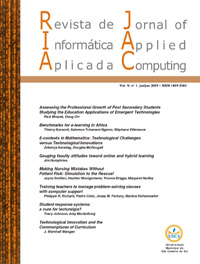Technological Innovation and the Commonplaces of Curriculum
DOI:
https://doi.org/10.13037/ria.vol5n1.380Keywords:
Schwab and Reid Theory Learning System, Technological InnovationAbstract
This paper reports on a case study of technological innovation, analyzed through the theoretical lens of the Schwab/Reid "commonplaces of curriculum." The Watershed was an interactive geographical learning system targeted at secondary school students in southwestern Ontario, Canada. My main focus in this paper is not on the technical aspects of this software system, but on the political and organizational issues it confronted during its introduction, which ultimately led to its failure and disintegration. Through an examination of the various contexts surrounding this innovation, and through interviews with the participants, the paper attempts to draw out some understanding of the forces affecting such endeavors, and to suggest some lessons that can be learned from the experience.Downloads
References
ADAMS, D. M., & HAMM, M. Media and literacy: Learning in an electronic age-issues, ideas, and teaching strategies (3rd ed.), Springfield, 2006.
BARLOW, J. P. The economy of ideas: Selling wine without bottles on the global net, 2000. Retrieved April 25, 2001, from http://www.eff.org/~barlow/EconomyOfIdeas.html.
GEE, J. P., HULL, G., & LANKSHEAR, C. The new work order: Behind the language of the new capitalism. Boulder, Colo.: Westview Press, 1996.
GOODSON, I. F. School subjects and curriculum change (revised 3rd ed.). Philadelphia: Falmer, 1992.
GOODSON, I. F. (Ed.). Social histories of the secondary curriculum: Subjects for study. Philadelphia: Falmer, 1985.
GOODSON, I. F., & MANGAN, J. M. Subject cultures and the introduction of classroom computers. British Educational Research Journal, 21(5), 613-628, 1995.
HANNAFIN, M. J. Emerging technologies, ISD, and learning environments: Critical perspectives. Education Technology Research and Development, 40(1), 49-63, 1992.
HARASIM, L. What makes online learning communities successful? In C. Vrasidas & G. V. Glass (Eds.), Distance education and distributed learning: Current perspectives on applied information technologies. Greenwich, Conn.: Information Age Pub, pp. 181-200, 2002.
KOSCHMANN, T. (Ed.). CSCL: Theory and practice of an emerging paradigm. Mahwah, New Jersey: Lawrence Erlbaum, 1996.
LANKSHEAR, C. (Ed.). Changing literacies. Buckingham, England: Open University Press, 1997.
LANKSHEAR, C., & BIGUM, C. Literacies and new technologies in school settings. Curriculum Studies, 7(3), 2000.
MANGAN, J. M. The politics of educational computing in Ontario. In L. Erwin & D. MacLennan (Eds.), Sociology of education in Canada (pp. 263-277). Toronto: Copp Clark Longman, 1994.
ONT. MIN. OF ED. (ONTARIO. MINISTRY OF EDUCATION AND TRAINING). The common curriculum: Policies and outcomes, grades 1-9. Toronto: Queen's Printer for Ontario, 1995.
ONT. RCOL (ONTARIO. ROYAL COMMISSION ON LEARNING). For the love of learning: Report of the Royal Commission on Learning. Toronto: Queen's Printer for Ontario, 1995.
OTA (OFFICE OF TECHNOLOGY ASSESSMENT). Teachers and technology: Making the connection. Washington, D.C.: Government Printing Office, 1995.
POINT OF VIEW. Current teacher's resources, 2000. Retrieved January 10, 2000, from http://academy.pointofview.cc/teacher_resource_CP.htm.
POLLOCK-ELLWAND, N. Blair cultural landscape inventory project: Final assessment. Toronto, Ontario: Ontario Ministry of Citizenship, Culture, and Recreation, 1998.
REID, W. A. The pursuit of curriculum: Schooling and the public interest. Norwood, New Jersey: Ablex, 1992.
REID, W. A. Curriculum as institution and practice: Essays in the deliberative tradition. Mahwah, N.J.: L. Erlbaum Associates, 1999.
ROBERTSON, H. J. No more teachers, no more books: The commercialization of Canada's schools. Toronto: McClelland & Stewart, 1998.
SCARDAMALIA, M., & BEREITER, C. Computer support for knowledge-building communities. In T. Koschmann (Ed.), CSCL: Theory and practice of an emerging paradigm (pp. 249-268). Mahwah, New Jersey: Lawrence Erlbaum, 1996.
SCHWAB, J. J., WESTBURY, I., & WILKOF, N. J. Science, curriculum, and liberal education : Selected essays. Chicago: University of Chicago Press, 1978.
STATS. CAN. (STATISTICS CANADA). Computer access at school and at home, 2002. Retrieved December 5, 2007 from http://www.statcan.ca/Daily/English/021029/d021029a.htm
Downloads
Published
Issue
Section
License
Copyright (c) 2010 J. Marshall Mangan

This work is licensed under a Creative Commons Attribution-NonCommercial-ShareAlike 4.0 International License.
Os autores que publicam trabalhos na RIA estão de acordo com os seguintes termos:
- Autores mantêm seus direitos autorais e concedem à RIA o direito à primeira publicação. Admite-se o compartilhamento do referido trabalho, desde que seja reconhecida sua autoria e publicação inicial nesta revista.
- Autores podem fechar contratos adicionais separadamente, para distribuição não exclusiva da versão do trabalho publicado na RIA, com reconhecimento de sua autoria e publicação inicial nesta revista.
- Autores podem publicar e distribuir seu trabalho online, antes ou durante o processo editorial.


